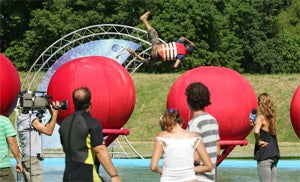The Weekend's Television: Total Wipeout, Sat, BBC1<br>Born Survivor: Bear Grylls, Sat, Channel 4<br>Timewatch – The Prince and the Plotter, Sat, BBC2
That sinking feeling

As unlikely as it sounds there's strong evidence that some sections of the audience relish tedium. Or – to put it in a way that may be more sympathetic – they fear unpredictablity and excitement, with a phobia so instinctive that they will only watch programmes that are guaranteed to be exactly the same, not just from series to series but from one five minutes to the next.
How else to explain the fact that BBC executives feel emboldened to commission a second series of Hole in the Wall or that Total Wipeout has just arrived back on our screens, to celebrate, once again, the apparently inexhaustible pleasure of watching people falling into ponds. You will think I'm exaggerating here, if you haven't seen the programme. There's bound to be more to it than that you'll say, and honesty compels me to admit that, yes, there are grace notes added to what format engineers call the person-pond interface. The people fall into them, for example, because they're negotiating a zany obstacle course, constructed by an Argentine television company. Some of the ponds are made out of mud. Some of the obstacles have cartoon boxing gloves popping out of them to detach particularly tenacious competitors. And in the middle of the obstacle course, there's a row of four giant inflated balls, which contestants are asked to bounce across. Hardly anybody makes it. In fact, most of them fall off the first one, in a way that becomes wearyingly familiar after about five minutes and close to mental torture once they've played you the slow-motion replays.
I should say here that I'm not inherently prejudiced against the pleasures of watching people fall into ponds. It's just that I'd like the spectacle to be seasoned with something other than Richard Hammond – linking the whole thing together from a studio several thousand miles away from the action – and rhyming exhortations bellowed by the sort of people who address themselves in the third person at moments of stress ("Come on, Judy!!"). Actually, looking through my notes, I see there was one point when I felt a flicker of interest, when Peter, the church minister, arrived at the top of the waterfall ramp and screamed, "In the name of the Father, in the name of the Son, in the name of the Holy Spirit... so help me God!!" I found myself wondering whether Peter's diocesan bishop wouldn't perhaps think that this counted as taking the Lord's name in vain. But, apart from that, and a brief period spent trying to think how the BBC will justify itself when one of the competitors sustains a serious spinal injury (as looks quite likely) it was about as exciting as watching porridge simmer.
Born Survivor: Bear Grylls is further proof that some audiences want exactly what they had yesterday, regurgitated and with a fresh bit of parsley on top as garnish. This week, Bear was trying to survive on the west coast of Ireland. I got quite excited when I read this in the Radio Times. I've been to the west coast of Ireland and I've had experience of surviving there. You drive about 10 minutes down any road, find a pub and eat soda bread and smoked salmon washed down with a pint of Guinness. If you're lucky there'll be a band playing and you'll be able to book a room for the night as well. Not for Bear, though, because that would be a departure from the almost religious orthodoxy of these programmes, as rigidly resistant to change as a Tridentine mass. He's got to eat revolting things – in this case a live crab and maggots picked out of the eye sockets of a rotting seal – and he's got to needlessly put himself in danger. If the justification for this stupendously silly programme really is the provision of survival tips then it seems odd that Bear should keep giving us examples of insanely reckless behaviour, such as tombstoning off a 25-foot sea cliff into a narrow inlet, rather than spending 20 seconds climbing down to a safer entry point. Or demonstrating the use of what he himself called a "kamikaze knot", a kind of dissected sheepshank that is positively lethal when used on modern synthetic ropes. These programmes should carry a health warning: "On no account to be watched by anyone planning to go outdoors".
Timewatch – The Prince and the Plotter, Huw Edwards's film about the investiture of the Prince of Wales turned out to be surprisingly interesting, even for a viewer with no inherent interest in Welsh nationalism or Royal pageantry. It was partly nostalgia for a time when if a terrorist blew himself up it was almost certainly an accident, but also the revelation – from archive footage of the Prince at 20 – that the Royal Accent has undergone a slow and stealthy democratisation over the last 40 years. He's not exactly Jamie Oliver these days, I know, but back then he was so upper crust he was practically unintelligible.
Subscribe to Independent Premium to bookmark this article
Want to bookmark your favourite articles and stories to read or reference later? Start your Independent Premium subscription today.

Join our commenting forum
Join thought-provoking conversations, follow other Independent readers and see their replies